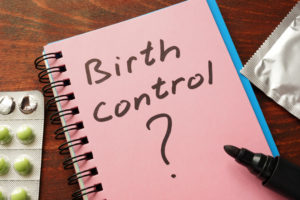By Iris Farrou
08 Apr, 2021
Lifestyle Tips, Mental Health
Best gyns in Buffalo, Best OB practices in Buffalo, Best OBGYN Groups in Buffalo, birth control, Buffalo OB-GYN, Buffalo OBGYN, Chouchani MD, mental health tips, WNY OB-GYN, WNY Ob-gyn doctors, WNY OBGYN, women's health
The conversation around the side effects of hormonal birth control and contraceptive pills on mental health has been around for a while: you may have heard women recounting their negative experiences with heightened depression symptoms, or mood swings, when switching contraceptive methods. Though personal experiences are not medical research, they do warrant attention.
In 2016 a Danish study of more than 1 million women, which focused on analyzing nationwide health records, showed that women using hormonal birth control were more likely to be treated for depression. On the other side, studies conducted in the US and Finland have showed that hormonal birth control users report less symptoms of anxiety and depression. Though just what effect hormonal birth control can have on mental health differs, one thing is for sure: it does affect it.
Hormones and Mental Health
Though there are no mental health risks directly associated with the use of contraception, we do know hormones—and hormone imbalances—can have an impact on mental health. To start with, women are twice as likely as men to suffer from depression: this is a difference that starts in adolescence due to the changing levels of estrogen.
During the follicular phase, which is the time between the start of a period and ovulation, estrogen levels are high. However, individuals with depression demonstrate lower levels of estrogen at that time. Hormonal birth control is likely to affect the natural levels of hormones in someone’s body, and therefore cause mental health changes.
Types of Hormonal Contraception and their Effects
Implant
There are two types of implants: one containing the progestin etonogestrel and another containing the progestin levonorgestrel. Results of the Danish study concluded that use of the etonogestrel implant led to higher use of antidepressants, especially for teens. People using that for two years have also reported mood swings and depression attributed to the implant. The risk for depression seems to heighten with the etonogestrel implant, but studies remain somewhat inconclusive.
Hormonal IUD
The Danish study on hormonal IUD showed that adolescent IUD users were more likely to be treated for depression than adult IUD users. However, a Finnish study suggested that women using this method were just as likely to showcase symptoms of anxiety and depression as women who were not using it. Like the implant, there is some evidence that IUD increases chances of depression but no direct conclusion.
Pills
Combined Oral Contraceptives (COCc) contain both synthetic estrogen and progestin. Though the Danish study found that users of COCs aged 16-31 were more likely to be prescribed an antidepressant, several other studies have shown that birth control users are not more likely to have symptoms of depression. However, people using COCs for reasons other than birth control have been found more likely to have depression.
There are several other hormonal contraceptive methods that can potentially affect mental health, but the three examined above are the most commonly used. Results may remain inconclusive, but if you are taking a hormonal contraceptive method and you experience unusual symptoms, you may consider consulting your doctor or healthcare provider.
More
 New and updated birth control methods seem to be on the rise, so it can be easy to get overwhelmed by the number of choices. When considering your birth control options, it is important to be educated on the numerous options, such as how they fit your lifestyle as well as their benefits and risks.
New and updated birth control methods seem to be on the rise, so it can be easy to get overwhelmed by the number of choices. When considering your birth control options, it is important to be educated on the numerous options, such as how they fit your lifestyle as well as their benefits and risks.
Birth Control Pill
Hormonal birth control prevents pregnancy with a combination of hormones, progesterone, and estrogen that stop ovulation and thicken the cervical mucus to prevent fertilization. It is only available by prescription and must be taken on a daily basis. With correct use, the pill is 99% effective. With actual usage, the pill’s effectiveness is about 91%. The pill’s effectiveness lowers with improper use (not taken every day), the antibiotic Rifampin, the antifungal Griseofulvin, some anti-seizure medicines, and the herb St. John’s Wort.
One key risk of the birth control pill is that it does not protect against sexually transmitted infections, necessitating the use of a condom. Additional potential health risks include blood clots, breast cancer, intermenstrual spotting, nausea, breast tenderness, headaches and migraine, weight gain, mood changes, missed periods, decreased libido, vaginal discharge, and changes to eyesight for contact lens wearers.
Condoms
Condoms are the most commonly used barrier method of contraception in which a physical boundary prevents sperm from entering the uterus and are available over the counter. They contain a reservoir tip to contain ejaculation. Condoms prevent against both pregnancy and sexually transmitted infections, especially HIV, gonorrhea, chlamydia, and trichomoniasis; they are also associated with a lower rate of cervical cancer, which is associated with HPV.
However, condoms are not 100% effective at either pregnancy or disease prevention. The success rate of condoms at pregnancy prevention is 14% to 15%. With typical use, the reduction in the transmission rates of syphilis, gonorrhea and chlamydia, and HIV are, respectively, 29%, 50%, 40%, and 85%. Additionally, some users are allergic to latex, the most commonly used condom material.
IUDs
An IUD is an Intrauterine Device; it is a tiny, T-shaped polyethylene device that is inserted into the uterus and prevents pregnancy by releasing hormones (same as the birth control pill), preventing sperm from traveling to the egg, keeps the fertilized egg from traveling to the uterus, and prevents a fertilized egg by implanting into the uterine wall. IUDs are 99% effective at preventing pregnancy. IUDs can be used for anywhere from 3 to 10 years, depending on the type.
Additionally, they are mostly hassle-free once inserted; users do not have to take a daily pill or use a condom with each instance of intercourse. Like hormonal birth control pills, IUDs do not prevent sexually transmitted infections. Also, some IUDs may make periods heavier and cramping worse. While pregnancy with an inserted IUD is very unlikely, it raises the risk for miscarriage, infection, ectopic pregnancy, and early labor and delivery. IUDs also can cause ovarian cysts and pelvic inflammatory disease.
More


